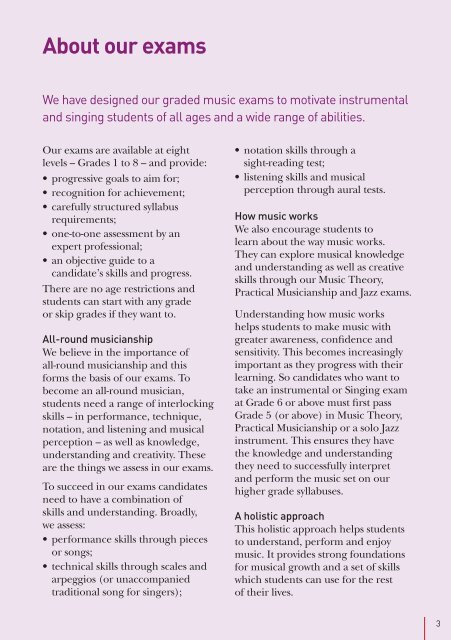theseMusicExams0607
theseMusicExams0607
theseMusicExams0607
You also want an ePaper? Increase the reach of your titles
YUMPU automatically turns print PDFs into web optimized ePapers that Google loves.
About our exams<br />
We have designed our graded music exams to motivate instrumental<br />
and singing students of all ages and a wide range of abilities.<br />
Our exams are available at eight<br />
levels – Grades 1 to 8 – and provide:<br />
• progressive goals to aim for;<br />
• recognition for achievement;<br />
• carefully structured syllabus<br />
requirements;<br />
• one-to-one assessment by an<br />
expert professional;<br />
• an objective guide to a<br />
candidate’s skills and progress.<br />
There are no age restrictions and<br />
students can start with any grade<br />
or skip grades if they want to.<br />
All-round musicianship<br />
We believe in the importance of<br />
all-round musicianship and this<br />
forms the basis of our exams. To<br />
become an all-round musician,<br />
students need a range of interlocking<br />
skills – in performance, technique,<br />
notation, and listening and musical<br />
perception – as well as knowledge,<br />
understanding and creativity. These<br />
are the things we assess in our exams.<br />
To succeed in our exams candidates<br />
need to have a combination of<br />
skills and understanding. Broadly,<br />
we assess:<br />
• performance skills through pieces<br />
or songs;<br />
• technical skills through scales and<br />
arpeggios (or unaccompanied<br />
traditional song for singers);<br />
• notation skills through a<br />
sight-reading test;<br />
• listening skills and musical<br />
perception through aural tests.<br />
How music works<br />
We also encourage students to<br />
learn about the way music works.<br />
They can explore musical knowledge<br />
and understanding as well as creative<br />
skills through our Music Theory,<br />
Practical Musicianship and Jazz exams.<br />
Understanding how music works<br />
helps students to make music with<br />
greater awareness, confidence and<br />
sensitivity. This becomes increasingly<br />
important as they progress with their<br />
learning. So candidates who want to<br />
take an instrumental or Singing exam<br />
at Grade 6 or above must first pass<br />
Grade 5 (or above) in Music Theory,<br />
Practical Musicianship or a solo Jazz<br />
instrument. This ensures they have<br />
the knowledge and understanding<br />
they need to successfully interpret<br />
and perform the music set on our<br />
higher grade syllabuses.<br />
A holistic approach<br />
This holistic approach helps students<br />
to understand, perform and enjoy<br />
music. It provides strong foundations<br />
for musical growth and a set of skills<br />
which students can use for the rest<br />
of their lives.<br />
3


